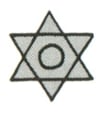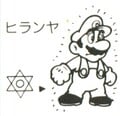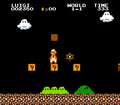Hiranya: Difference between revisions
From the Super Mario Wiki, the Mario encyclopedia
Jump to navigationJump to search
No edit summary |
m (Text replacement - "(\| *)Jap([RMCN\d]* *=)" to "$1Jpn$2") |
||
| Line 17: | Line 17: | ||
==Names in other languages== | ==Names in other languages== | ||
{{Foreign names | {{Foreign names | ||
| | |Jpn=ヒランヤ<ref>{{cite|title=''All Night Nippon: Super Mario Bros.'' instruction booklet|page=10}}</ref> | ||
| | |JpnR=Hiran'ya | ||
| | |JpnM=- | ||
}} | }} | ||
Latest revision as of 10:49, January 7, 2025
The title of this article is official, but it comes from a non-English source. If an acceptable English name is found, then the article should be moved to the new title.
| Hiranya | |
|---|---|
 Artwork from the manual | |
| First appearance | All Night Nippon: Super Mario Bros. |
| Effect | Makes Mario invincible |
A Hiranya is a symbol popularized by the Japanese radio show Yūji Miyake's Young Paradise, the radio program that preceded All Night Nippon on the same station. A segment on that show claimed the Hiranya has mysterious powers and is buried somewhere in Tokyo, daring the listeners to hunt for it to claim a prize. In All Night Nippon: Super Mario Bros., the Hiranya replaces the Super Star.
Gallery[edit]
Hiranya in World 1-1
Names in other languages[edit]
| Language | Name | Meaning | Notes |
|---|---|---|---|
| Japanese | ヒランヤ[1] Hiran'ya |
- |
Trivia[edit]
- The official appearance of the Hiranya is a golden hexagram embossed on a hexagon with a circular hole in the center as can be seen in the computer game YanPara Adventure: Hiranya no Nazo released months earlier in 1986.[2]
References[edit]
- ^ All Night Nippon: Super Mario Bros. instruction booklet. Page 10.
- ^ ヤンパラアドベンチャー ヒランヤの謎. Game Preservation Society. Retrieved December 14, 2024.


